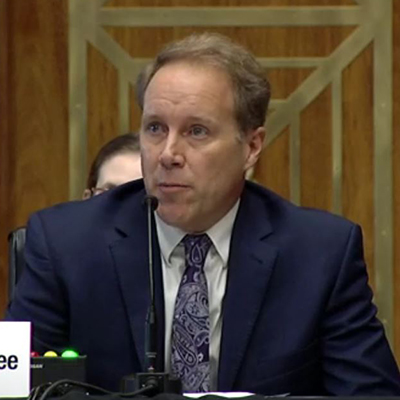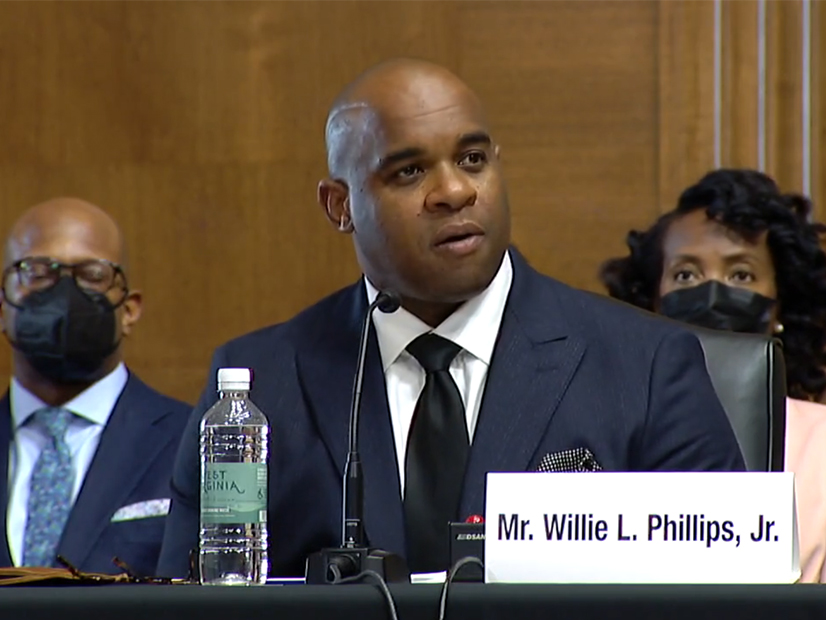It was a dull Tuesday for FERC watchers, as President Biden’s first nominee to the commission, Willie Phillips, faced few questions from members of the Senate Energy and Natural Resources Committee at his confirmation hearing.
Those he did receive were mostly vague, nonspecific queries about ensuring reliability and affordability. Though asked several times about transmission planning and operations, Phillips cited FERC’s ongoing Advance Notice of Proposed Rulemaking on those topics, a broad inquiry that required him not to prejudge or take any specific positions, he said.
When asked by Sen. John Hickenlooper (D-Colo.) what he could do to improve transmission planning and alleviate transmission congestion, Phillips responded, “You’re asking the right questions, senator.” He noted that the commission had posed more than 200 questions about its transmission planning process rules and other related topics. “And I do share your concerns. … If we are going to meet our [climate] goals, I believe that electric transmission will play an important part in doing that.”
In response to Sen. Maria Cantwell’s (D-Wash.) question about whether “we need to do more” to encourage interregional transmission projects, including DC interties, Phillips simply answered, “Yes, absolutely.”
And though ranking member John Barrasso (R-Wyo.) used his opening comments on Phillips’ nomination to lambast Democrats’ proposed provisions in the House of Representatives’ pending budget reconciliation bill, he never asked Phillips anything about those provisions. In a previous hearing that featured all four current commissioners, Republicans took it as an opportunity to criticize the Biden administration’s energy policies. (See Senate Hearing on FERC Jurisdiction Focuses on Everything Else.)
Instead, Barrasso “commended” Phillips, chair of the D.C. Public Service Commission, for “putting reliability first” in his job and opening remarks, and emphasizing a balance among reliability, affordability and sustainability.
Biden announced his choice of Phillips last month. (See Biden to Nominate Phillips to FERC.) In Phillips’ opening statement, he highlighted his experience not just at the D.C. PSC, but also as assistant general counsel at NERC.
“I worked with some of the sharpest legal minds in the industry to draft reliability standards for the bulk power system, including Critical Infrastructure Protection standards,” he said. “I have a keen awareness of the cybersecurity and physical security threats that we face as a nation. And, as the effects of climate change and extreme weather increasingly challenge the reliability of our grid, it is imperative that we work to ensure that our nation’s energy infrastructure is resilient. Reliability depends on our vigilance against these threats.”
If confirmed, Phillips would break the 2-2 partisan makeup at the commission that has led to several tie votes and high-profile proposals that have become effective by operation of law, including a new minimum offer price rule for PJM and the creation of the Southeast Energy Exchange Market.
Historic NPS Director Pick
It was not just the nature of the questions that kept Phillips brief: The committee was simultaneously considering two other nominees, including Charles Sams, who if confirmed would not only be the first official director of the National Park Service since January 2017, when Barack Obama was still president. He would also be the first person of Native American descent to ever serve in that position.
 Brad Crabtree, Carbon Capture Coalition | Senate ENR Committee
Brad Crabtree, Carbon Capture Coalition | Senate ENR CommitteeFormer President Donald Trump nominated David Vela to the post in 2018, and the committee soon after advanced him to the Senate floor, but he was never confirmed. Then-Interior Secretary David Bernhardt appointed Vela as director on an acting basis; he served until late 2020.
The unique nature of his nomination led senators to focus on Sams for most of the two-hour hearing, with many seeking commitments about national parks in their home states. The service is understaffed, and parks have been inundated with visitors after COVID-19 restrictions were lifted and more people got vaccinated.
The committee also considered Brad Crabtree, vice president of carbon capture for the Great Plains Institute and director of the Carbon Capture Coalition, to be assistant secretary of energy for fossil energy and carbon management. Though he received more attention than Phillips, he was likewise overshadowed by Sams.




